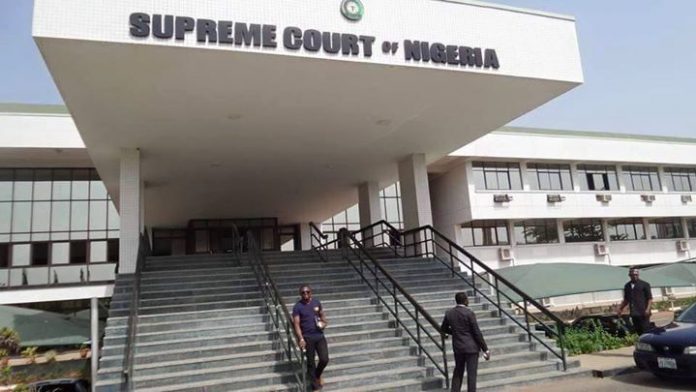By Onyewuchi Ojinnaka
The Supreme Court of Nigeria on Friday declared the Fiat given by the former President of the Court of Appeal, Justice Zainab Bulkachuwa (rtd), to Justice Mohammed Idris who was elevated to Appeal Court from the lower court to continue and conclude the trial of former Abia State governor, Senator Orji Uzor Kalu, unconstitutional.
The Apex Court held that since Justice Idris had been elevated to Appeal Court, he had no powers to continue to adjudicate over a criminal matter at the lower court.
It held that Section 396(7) of the Admistration of Criminal Justice Act (ACJA) 2015 which the President of Court of Appeal relied on in giving the fiat was unconstitutional as it has not been amended accordingly in the constitution.
Consequently it nullified the conviction and sentence of 12 years and 10 years imprisonment handed to Uzor Kalu and his former finance director, Jones Udeogu, and ordered fresh trial for the duo.
As expected, the Supreme Court decision is eliciting reactions from lawyers.
Chairman, Presidential Advisory Committee against Corruption ( PACAC), Prof Itse Sagay (SAN), expressed his disappointment., describing it as an unpleasant surprise,
Though he is yet to read the judgement having heard about it from a journalist who called him on the development, he is however of the opinion that since the goal of the 2015 ACJA is to provide speedy dispensation of justice, there is nothing wrong in asking a judge to conclude a matter he started in line with the provisions of ACJA.
“In my view, it is not unconstitutional. It is a provision introduced to stall delays in our courts. That is about what it tries to solve.
“There is no provision in the constitution which prohibits what the National Assembly did.
“I don’t know the basis of the Supreme Court decision.”
Prof Sagay said that it was before that judges who were elevated or go on transfer could not continue with the case they started but now the National Assembly came up by passing the relevant provisions in ACJA 2015.
“I don’t understand the Supreme Court. They (Justices of Supreme Court) must think of the negative impact and not on technicalities of the case.
“To be doing anything like this is a major setback. I don’t understand why they should be abandoning the interest of justice and be going for technicalities.
“What they have done is extremely harmful and not helpful to ACJA” Sagay decried.
However, another Senior Advocate of Nigeria, Abiodun Owonikoko, in his reaction said he knew that the judgment of the trial court was technically flawed though not looked at on its merits, hence the order by the Supreme Court for fresh trial (de novo) .
“It was easy to predict that it might not survive on appeal based on that snag of the judge coming back from Court of Appeal to deliver judgment on a criminal trial that he did not conclude before his elevation.
“Who delivered the judgement at the trial court? Was it Idris J (as he had then ceased to be), or Idris JCA ( as he had already become at the material time)?” Owonikoko asked
He pointed out that ACJA law gave that leeway but it requires a constitutional amendment to validate it .
“Unfortunately we did not have such amendment at the material time and sadly, till date.”
He said the lynch mob mentality of conviction by whatever means misled the Economic and Financial Crimes Commission (EFCC) to continue with the trial after Idris JCA had been appointed a Justice of the Court of Appeal.
According to the SAN, the injustice of the judgment is made all the more glaring when the erstwhile convict has had to serve some time in prison whereas he is yet to be convicted; only to face a new trial for the same offenses without a chance for compensation for the time served (wrongfully) in the event he is eventually found not guilty.
All hope is not lost however; the legislature can be approached to do the needful, he concluded.
A human rights lawyer and Senior Advocate of Nigeria, Femi Falana, said the Supreme Court has not set Orji Kalu free but rather ordered that his trial be taken afresh at the lower court.
Meanwhile, the EFCC has vowed that it will file charges for immediate retrial of Senator Orji Kalu, whose conviction and 12-year imprisonment for stealing N7.2 billion from Abia State treasury was quashed by the Supreme Court on Friday.
Recall that after 12 years of standing trial before a Federal High Court in Lagos Nigeria, former governor of Abia State and a Senator of the Federal Republic of Nigeria, Dr Orji Uzor Kalu, was on Thursday December 5, 2019 convicted and sentenced to a concurrent jail term of 12 years imprisonment over N7.2 billion fraud.
The second defendant who was Commissioner for Finance under him, Jones Udeh Udeogo, was also convicted and sentenced to 10 years imprisonment.
The sentence was handed down to the convicts by Justice Mohammed Idris J.C.A. who was given a fiat by the then President of Court of Appeal, Justice Zainab Bulkachuwa, to conclude the trial.
The Economic and Financial Crimes Commission (EFCC) had for 12 years prosecuted Orji Kalu together with his former Commissioner for Finance, Jones Ude Udeogo, and a Company, Slok Nigeria Ltd, on the alleged offences.
The Commission had on October 31, 2016, preferred a 34-count charge bordering on N3.2 billion fraud against the accused. However, the charges were on July 16, 2018, amended to 39 counts with the sum increased to N7.2 billion.
The convicts had each pleaded not guilty to the charges, and were granted bail. TheNiche recalls that in May 2018, Justice Idris who sat as trial judge in the fraud case against Kalu, was elevated to the Court of Appeal.
He, had however, conducted trial by a fiat from the Appeal Court President, authorising him pursuant to Section 396(7) of the ACJA to continue and conclude the case (which the Supreme Court declared unconstitutional on Friday May 8, 202.
Following accelerated hearing, Idris concluded trial of the defendants in August 2019 and adjourned the case for adoption of addresses.
On October 22, both the prosecution and defence counsel respectively adopted their written submissions before the court and Justice Idris consequently reserved judgement until December 2.
On December 2, judgement could not be delivered as the judge was away for an election appeal tribunal. The case was rescheduled for December 5
On December 5, the court delivered judgement, convicted and sentenced the defendants to prison.
.















